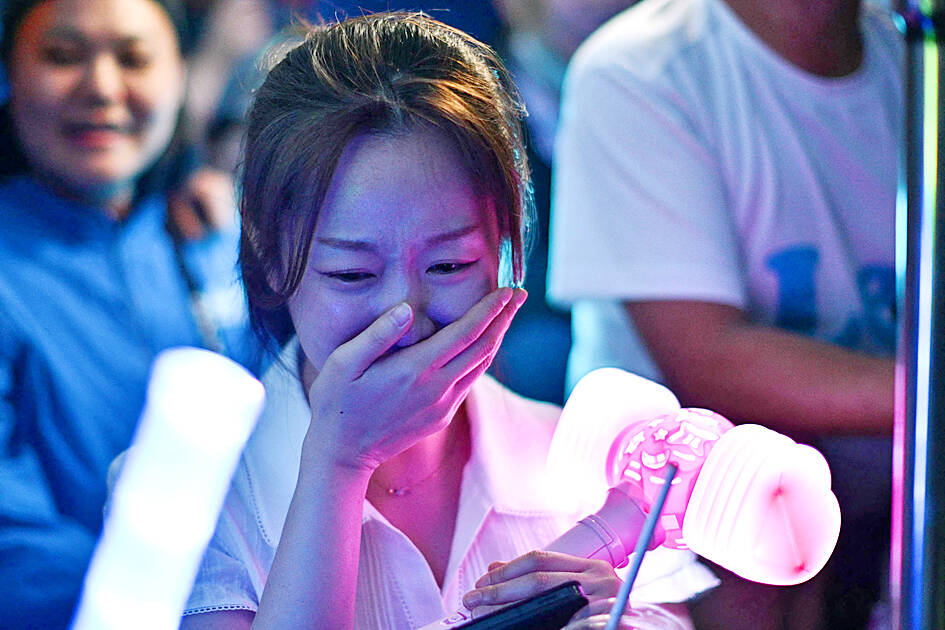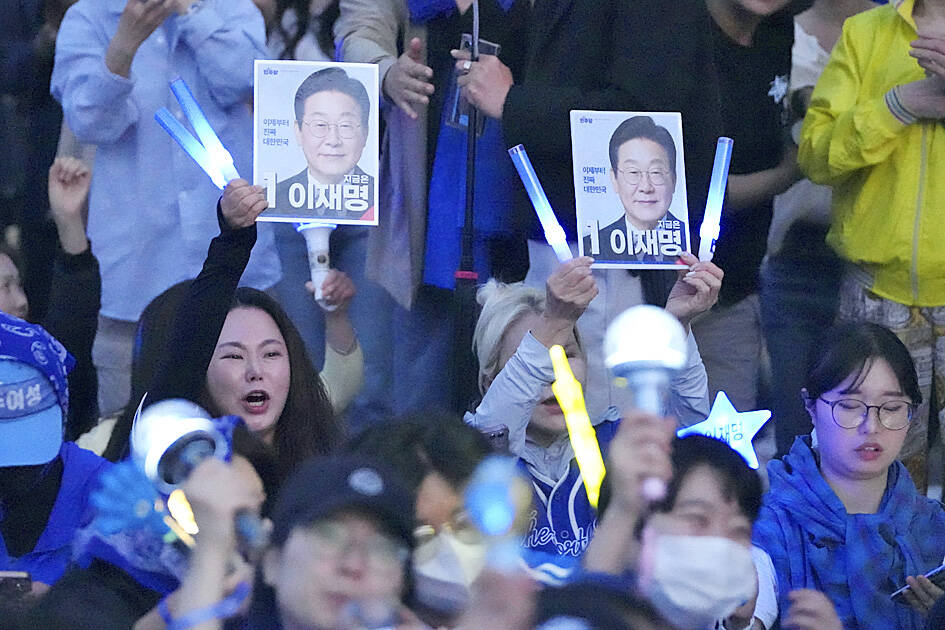South Korean presidential candidate Lee Jae-myung of the left-leaning Democratic Party appeared on track to win the election by a landslide, exit polls showed yesterday, with turnout high after months of political chaos.
Six months to the day after former South Korean president Yoon Suk-yeol plunged the country into crisis with his disastrous declaration of martial law, an exit poll by the three major broadcasters showed Lee with 51.7 percent of the vote.
Conservative challenger Kim Moon-soo was on track to win 39.3 percent, the poll showed.

Photo: AFP
After months of turmoil and a revolving door of lame-duck acting leaders, many South Koreans were eager for the country to move forward, with major polls for weeks putting Lee well ahead of Kim.
“I hope the next president will create an atmosphere of peace and unity rather than ideological warfare,” cab driver Choi Sung-wook, 68, said as he cast his ballot.
South Korea’s next leader is to take office almost immediately — as soon as the National Election Commission finishes counting the votes and validates the result, likely early today.

Photo: AP
He will face a bulging in-tray, including global trade vicissitudes chafing the export-driven economy, some of the world’s lowest birthrates and an emboldened North Korea rapidly expanding its military arsenal.
However, the fallout from Yoon’s martial law declaration, which has left South Korea effectively leaderless for the first months of US President Donald Trump’s tumultuous second term, was the decisive factor in the election, experts said.
The vote was “largely viewed as a referendum on the previous administration,” said Kang Joo-hyun, a political science professor at Sookmyung Women’s University.
“The martial law and impeachment crisis not only swayed moderates, but also fractured the conservative base,” Kang said.
Conservative candidate Kim — Yoon’s labor minister — failed to convince a third-party candidate, Lee Jun-seok of the Reform Party, to unify and avoid splitting the right-wing vote.
Yoon’s impeachment over his martial law bid, which saw armed soldiers deployed to parliament, made him the second straight conservative president to be stripped of office after Park Geun-hye in 2017.
Many voters said they had been shocked by his attempt to suspend civilian rule.
It “was the kind of thing done during the old days of dictatorship in our country,” said Park Dong-shin, 79, adding that he cast his ballot for the candidate who would make sure those responsible were “properly dealt with.”

CROSS-STRAIT COLLABORATION: The new KMT chairwoman expressed interest in meeting the Chinese president from the start, but she’ll have to pay to get in Beijing allegedly agreed to let Chinese Nationalist Party (KMT) Chairwoman Cheng Li-wun (鄭麗文) meet with Chinese President Xi Jinping (習近平) around the Lunar New Year holiday next year on three conditions, including that the KMT block Taiwan’s arms purchases, a source said yesterday. Cheng has expressed interest in meeting Xi since she won the KMT’s chairmanship election in October. A source, speaking on condition of anonymity, said a consensus on a meeting was allegedly reached after two KMT vice chairmen visited China’s Taiwan Affairs Office Director Song Tao (宋濤) in China last month. Beijing allegedly gave the KMT three conditions it had to

STAYING ALERT: China this week deployed its largest maritime show of force to date in the region, prompting concern in Taipei and Tokyo, which Beijing has brushed off Deterring conflict over Taiwan is a priority, the White House said in its National Security Strategy published yesterday, which also called on Japan and South Korea to increase their defense spending to help protect the first island chain. Taiwan is strategically positioned between Northeast and Southeast Asia, and provides direct access to the second island chain, with one-third of global shipping passing through the South China Sea, the report said. Given the implications for the US economy, along with Taiwan’s dominance in semiconductors, “deterring a conflict over Taiwan, ideally by preserving military overmatch, is a priority,” it said. However, the strategy also reiterated

‘BALANCE OF POWER’: Hegseth said that the US did not want to ‘strangle’ China, but to ensure that none of Washington’s allies would be vulnerable to military aggression Washington has no intention of changing the “status quo” in the Taiwan Strait, US Secretary of Defense Pete Hegseth said on Saturday, adding that one of the US military’s main priorities is to deter China “through strength, not through confrontation.” Speaking at the annual Reagan National Defense Forum in Simi Valley, California, Hegseth outlined the US Department of Defense’s priorities under US President Donald Trump. “First, defending the US homeland and our hemisphere. Second, deterring China through strength, not confrontation. Third, increased burden sharing for us, allies and partners. And fourth, supercharging the US defense industrial base,” he said. US-China relations under

The Chien Feng IV (勁蜂, Mighty Hornet) loitering munition is on track to enter flight tests next month in connection with potential adoption by Taiwanese and US armed forces, a government source said yesterday. The kamikaze drone, which boasts a range of 1,000km, debuted at the Taipei Aerospace and Defense Technology Exhibition in September, the official said on condition of anonymity. The Chungshan Institute of Science and Technology and US-based Kratos Defense jointly developed the platform by leveraging the engine and airframe of the latter’s MQM-178 Firejet target drone, they said. The uncrewed aerial vehicle is designed to utilize an artificial intelligence computer